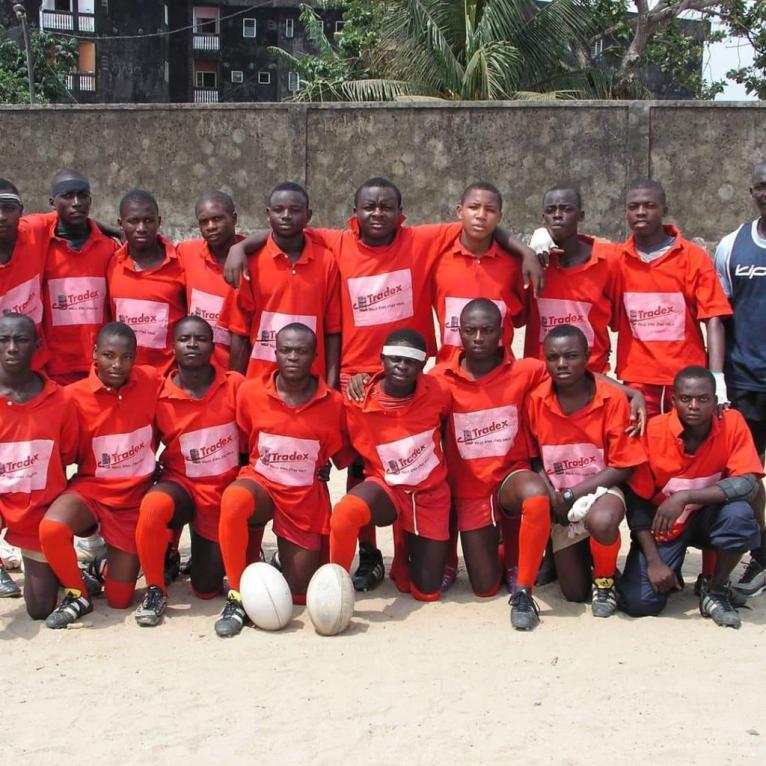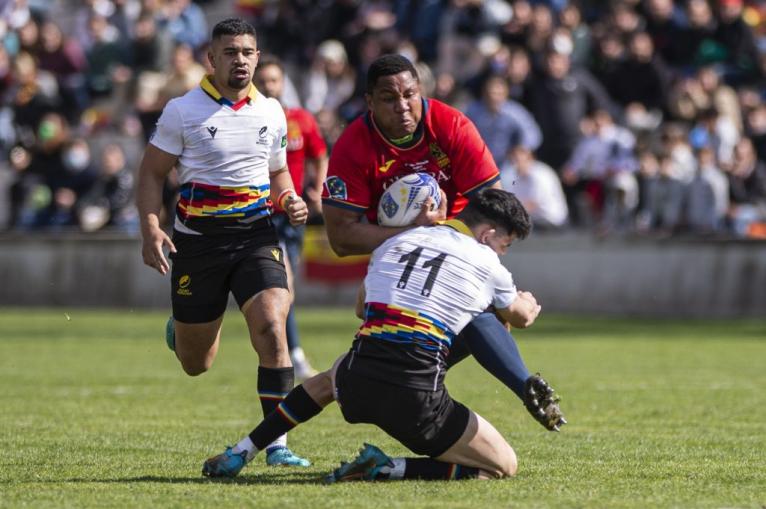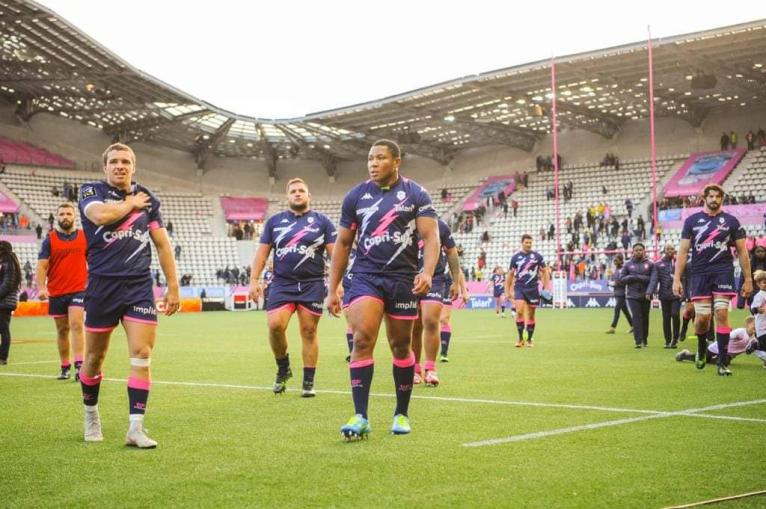While most of his future teammates in the Spain national team were playing for their clubs, Thierry Youtcheu Nyami was quite literally running for his life, fighting to escape the poverty of his upbringing and fulfil a deep-rooted childhood dream.
The Cameroon-born prop, who changed his name to Thierry Futeu after becoming a Spanish citizen, has charted the most arresting journey from Douala in his homeland to international rugby in his adopted nation, a voyage marked by robbery, desperation, heartache and an illegal border crossing.
A talented teenager and one of three siblings, Futeu left Cameroon for Morocco in 2013 having been promised a professional contract. His father did not approve of rugby, and so Futeu had kept his plans to himself. The deal was a ruse. He was left penniless and scared, miles from home.

“I was always coming back from training with my shirt torn, bruised, and tired,” Futeu tells RugbyPass. “My father wanted me to keep studying, and rugby kept my head off it. I never liked studying and it got worse when I decided I wanted to pursue a career as a professional rugby player when I was eighteen. I was called for a Cameroon Under-20s camp and some friendlies and talked with a few of the guys who were already playing abroad, and that was the starting point for what came next.
“Unfortunately, the pro contract in Morocco was a lie. They lied to me about the level of club rugby and the conditions. I just wanted to find ways to help my family at home. We weren’t poor, but needed money.
“My problems started in Niger when I was robbed. They took everything, my documentation, money, clothes – everything. I had to call home, but it wasn’t going to be a nice conversation, as I had left without ever telling them. My father told me he was going to send me money, but under the condition I had to go back. I didn’t and paid some people to help me get to Morocco again. I first had to stop in Algeria where I worked in an olive farm, and then got to Morocco.”
Futeu had eyes for Spain, lying enticingly close but desperately out of reach over the Alboran Sea. A better life, a chance to play the game he loved.
The policeman who pursued me fell, and before he tried to get up, I picked up a stone and pretended to throw it at his head.
“In Morocco, I was helped by a family who picked me up from the streets and opened their home. I worked in the family restaurant and earned some money to then move to the next stage: to cross the border. I knew it was going to be a messy situation, and it would take some time and attempts, but I had to do it. For me, for my family, for the dream I had.”
The border crossing between Morocco and Spain is a delicate subject in international law, as authorities have reportedly used heavy-handed, and even lethal, measures to stop the flow of immigrants north. It took Futeu three attempts to make it to the Spain-controlled city of Melilla in northeast Morocco, via a towering and heavily guarded fence, and find a refugee camp. He still remembers exact date and time of his crossing, a life-changing, fear-driven, early-morning dash.
“It was 28th May 2014. The Champions League final was played on the 24th and Morocco stopped to watch Real Madrid vs Atlético Madrid. At 5am my group woke up, packed our things, and rushed through the forest of Gorogo. There were a few obstacles – first, a helicopter kept passing by, which made some of us go back. I and a few others stayed and kept pushing. I wasn’t going back, I couldn’t.
“After walking for quite a bit, a police car tried to cut us off, and it chased us. They drove and separated the group into two. The policeman who pursued me fell, and before he tried to get up, I picked up a stone and pretended to throw it at his head. He flinched and braced, and I took that as my last chance to sprint for the border. Thankfully, somebody helped me to climb the railing. Then another sprint to the refugee camp.”
Futeu had made it. He started to learn Spanish in the camp and underwent a thorough health check. Even amidst all this trauma and upheaval, he found solace in sport.

“There was a rugby league team, Griffón, who practised near the camp and I tried my luck with them. After a couple of weeks, I moved to Malaga and then Madrid, where my rugby journey started. My team always had practice at the Estadio Universitario de Madrid. One day I arrived early to training, and was waiting for my teammates. But, on the horizon, I saw three policemen coming in my direction. I thought ‘I am done for. Where can I hide? Should I hide?’. A million thoughts popped into my head, and then I realised something: they were my teammates. I was playing in a cop team!”
Futeu, or ‘Titi’ as he is known, explained everything to his teammates, who understood and promised to help him with his documentation. He remembers the word they used to define them all: family. At long last, he felt at home.
And his talent on the field soon drew admirers. While playing in a sevens tournament in 2015, he was spotted by the Alcobendas club who offered a semi-professional contract and work. He converted from the back-row to the front-row and began playing in Spain’s top-tier Division de Honor and when he became eligible, answered the call of the national team.
As their son battled thieves, immigration officers and life far overseas, what did Futeu’s parents make of all this?
To be able to play for Los Leones was a goal I dreamed of since crossing the border. I remember crying non-stop when I first heard the national anthem as an international player.
“My parents were and are still proud of me. But they told me the truth: they didn’t sleep well for almost three years, always wondering where I was, who I was with, if I was being properly taken care of, if I was eating.
“I remember calling my dad and telling him ‘Spain wants me to play for them. What do you think?’. And he immediately replied ‘Yes, you should take the call. They took you in, fed you, gave you a career, and love you. It is the proper way to say thank you for all they have done.’ It was an easy conversation to have. To be able to play for Los Leones was a goal I dreamed of since crossing the border. I remember crying non-stop when I first heard the national anthem as an international player. All the memories from Cameroon, Niger, Morocco, and my first time in Spain came back to my mind. I had done it.”
The 28-year-old made such an impact on the international stage he was signed by mighty Stade Francais in 2019. From playing U20 rugby in Cameroon to being robbed and defrauded in Africa and a refugee in Spain, he had reached the unimaginable heights of the Top 14.
“It was simply astounding. I met Sergio Parisse, Ramiro Herrera, and a few others who helped me to get around. I have such incredible memories from that season, like scoring a try against Zebre. I saw the opportunity and just dived from the ruck to get to the line. I learned a lot in that season and became a better player.”
A year later, after covid laid waste to the professional game, he moved to Carcassonne in the ProD2. Another special experience, but blighted by his refusal to abandon international rugby.
“Carcassonne treated me well, but my decision to keep playing for Spain drove a wedge between me and the club. It would ultimately lead to not getting my contract renewed, as they wanted a club prop and not an international player who would miss five to eight games per season. I was not going to stop playing for my country.”
Along the way, Futeu was granted the sweet sanctuary of citizenship, meaning he had to take his mother’s surname as required by Spanish law. Word of his acceptance last June came from an unlikely source.

“I was heading to Cameroon to spend a few days there, and Rodrigo Contreras, a Spanish journalist, called me saying ‘Congratulations!’ and I was like ‘Congratulations? Why?’, and he replied ‘Well for your citizenship! It has been approved. Didn’t the union inform you?’. It seems neither the union nor my lawyer had checked for any updates about the citizenship. It was amazing in a weird way!”
Though running out in the bright red and yellow of Spain has been a blissful experience, it has not been without frustration. Los Leones missed out on last year’s World Cup having fielded an ineligible player during qualifying, with Rugby Europe Championship rivals Romania and Portugal earning their spots in France.
“It was hard for everyone, especially those who won’t make it to 2027 or who already missed 2019. I knew I still had the chance to play at least one or two World Cups, but for some of my teammates it was the end of their international careers.”
Spain is now under Pablo Bouza’s command, with the Argentine leading a new era and World Cup qualification the ultimate goal again.
“He has brought a lot of change and positivity. He likes to listen to the players and understand what we think and how we can work more efficiently. I know we will be in the next Rugby World Cup. The team has a lot of potential, and if we have our best team and play with the same work-rate and passion, we can even win the Rugby Europe Championship.
“Spain has the potential to be big in rugby. We are great at football, handball, basketball, boxing, and motorsports. Why not rugby? We are going to do it.”
Futeu now plays for Chartres in the third tier of French rugby, less than 100km southwest of Paris. His story is extraordinary, perhaps without parallel in international rugby. But he cannot advocate for others to follow his dangerous path. He hopes to help fellow aspiring players in Cameroon find a safer, and legal, path to professional rugby.
“Let me say I was afraid all the way until I got into Spain. It was dangerous, crazy and it could’ve ended badly for me. I want to help young guys who want to be pro players to have an easier way, and I hope to create a programme that allows them to pursue that. I will always be a Cameroonian, but I am Spanish. I love it there, for everything they have done for me, for all the people who opened their homes and supported my dream. I can only have a smile for them. I owe everything to them and Spain.”


I bet he inspired those supporters just as much.